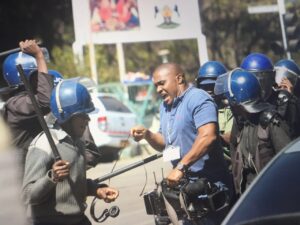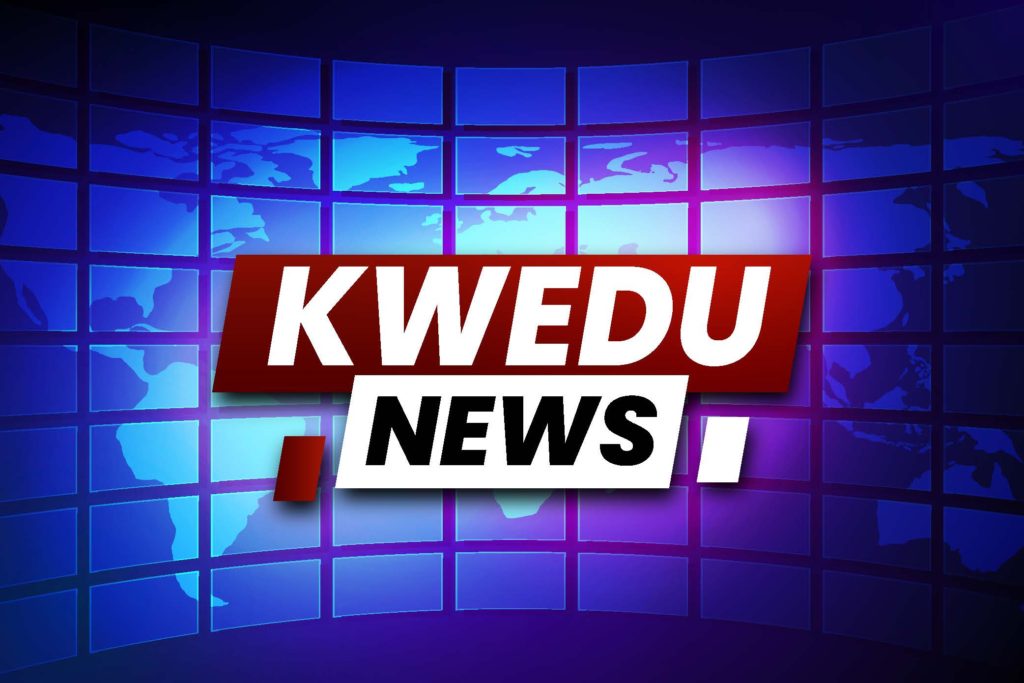Zimbabwe Police Warn Journalists Ahead of 2023 Elections
By Delicious Mathuthu
The Zimbabwe Republic Police have warned Journalists to be extra cautious when executing their duties during mass gatherings ahead of the 2023 elections and also ensure balanced and objective reporting.
Police said scribes should always prioritise their safety when covering public events with a potential of turning violent.
They said journalists should always identify themselves with ground commanders and listen to police instructions as it becomes difficult for deployed officers to differentiate between them and rioters.
Speaking in Gweru on Monday (13/02/2023) National Police Spokesperson, Assistant Commissioner Paul Nyathi, said Journalists should work with police officers and distance themselves from being entangled with politicians incase of violence, for their safety.
“We appeal to journalists to identify themselves to ground commanders. Why? Because it will assist our officers to recognise them.
“Some will say I want a scoop but don’t go for the scoop at the expense of your life.
“Sometimes you will be assisted by these ground commanders to say, Terry what you want to do here I can foresee danger, can you do it in such a manner that police officers can consider your safety.”
“As we move into the election, I know there going to be rallies and we have made it clear that you as the media don’t be used by politicians.
“Perfect (Hlongwane) spoke about it saying we have a challenge as the police where you find that there certain journalists whom we know, who move around with politicians.
“When you have a problem its difficult to separate the journalist from the politician.
“Very difficult because you have been offered a lift, you are traveling together, there is a disorder situation and the police want to restore order, how do they separate you from the politician?” Assistant Commissioner Nyathi said.
He also said there politicians who use the media for cheap political scores.
“We have a challenge of some politicians who want to be arrested in the full view of the media.
“They want to move around with the media, they provoke a situation and when arrests are effected they want the media to capture the arrest,” he said.
He further said clashes between the two professions, media and police, compromise relations hence the need for engagement to have a common ground.
He however warned that journalists who commit crimes outside of work will be arrested just like any ordinary lawbreaking citizen.
“In our country no one is above the law. We appeal to journalists to separate their work life and private life.
“When you fight with your wife, thats a separate issue from your work, if a report is made, police can come in and arrest you.
“Or where you are drinking beer at a pub, if you have a challenge there and you are arrested, you are not at work, surely you need to give the police space to do their job.
“But when you are doing your journalism work, doing your media work, we will recognise that, we will respect that,” Asst Commissioner Nyathi said.
He also warned that the media should uphold their pledge to ensure fairness and publish “stories which are not sensationalised, stories which do not cause alarm, stories which do not make people despise the police.”
Speaking during the same meeting, Officer Commanding Police in the Midlands, Commissioner Winston Muza, reiterated Nyathi’s words on safety adding that it is difficult for officers on the ground to identify journalists during chaotic situations.
“The first thing to do is to make sure that you are safe then you do your job serving the nation, be in a safe place.
“One of the resolutions we made in 2018 we said that when we get into situations lets identify ourselves to police officers on the ground.
“If you do that we can assure you that you will be more than safe.
“What usually happens when you are on the ground is this; when I get there and for me to ensure that their is a state of order, I see that there should be no one from there to there; I should see no one.
“So if anything that looks like a human standing there, I will ensure that it has moved very fast.
“And honestly there, you will bear with your police officers. If they start selecting that this object must remain, that object must move they will have serious challenges. So they will not have time for negotiations.
“Even if you are going to come out of the disorder with your card, my eyes do not see,” Commissioner Muza said.
Veteran Journalist and Media Institute of Southern Africa Zimbabwe Chapter (MISA-Zim) Board Chaiperson Cris Chinaka warned fellow scribes that no story is worth their life.
“No story is worth dying for, thats why we have these tips. We negotiate our space and the negotiation starts with knowing the officers on the ground.
“We encourage our media to see how other journalists from other countries behave, its standard, you have to try to get to a place where its safe, and normally its safe behind the police, thats standard.
“You need to know and understand policing in order to report around policing,” he said.
Media Alliance of Zimbabwe Chaiperson and Zimbabwe Union of Journalists Secretary General, Perfect Hlongwane, said the engagement meetings between the media and police seek to evaluate the current situation in as far as journalism safety is concerned.
He said after noticing several violations of journalists’ rights, the alliance decided to engage responsible authorities and stake holders to find common ground.
A programme to go around the country as members of MAZ to engage the police command element, with the hope that the engagement will cascade to lower ranks so that there is a common understanding was started, Hlongwane said.
“Last year we noted that there has been some violence mated on Journalists.
“There had been some reports on issues around violations of journalists, not necessarily physical violation but violations of even rights.
“At times you are barred from covering events because you come from a particular,or you report for a particular organisation; that is a violation.
“One of our priorities is to ensure that journalists are safe when carrying out their job.
“From previous engagements I said both entities, the ZRP and the media are serving the same person, the public.
“You are there to ensure that there is peace, there is order, there is security; journalists are there to ensure that the same person who you provide the security for has information of what is happening in the country and with rights from the constitution for our mandates, both of us,” Hlongwane said.
Present during the engagement meeting were several senior police officers from Midlands and Harare, media organisations representatives under MAZ and some Senior Journalists from Gweru.
Highlighting some of the incidences of Journalists being arrested by police in line of duty in Gweru, MISA-Zim Gweru Chapter Chairperson, Terry Madyauta, said Freelance journalist Dumisani Ndlovu was once arrested for taking pictures and detained at Mtapa police station.
Journalists Elizabeth Mashiri from The Mirror and Zimpapers’ Patrick Chitumba were detained by believed military personnel after taking pictures of a military training plane that had crushed and reportedly forced to delete their footage.
During Covid 19 lockdown, Madyauta said Zimpapers journalist Freedom Mupanedemo was once arrested on his way to work.
Elsewhere, on 27 July 2017, three journalists, Abigail Matsikidze, Obey Manayiti and photographer Shepard Tozvireva from the Alpha Media Holdings (AMH) group and their driver, Raphael Phiri in Harare were brutally assaulted by plain-clothed police officers and arrested.
On 21 October 2019 police officers assaulted and injured a young NewsDay female journalist in Harare after passing by a group of police officers while on assignment allegedly for “wearing a camera”.
The Committee to Protect Journalists (CPJ) reported that between Thursday October 6 and Monday October 10, 2022, five journalists were assaulted, briefly detained, and prevented from covering events by police, ZANU-PF activists, and suspected government agents from the Central Intelligence Organisation (CIO).

Kwedu Classics
Your story our story

